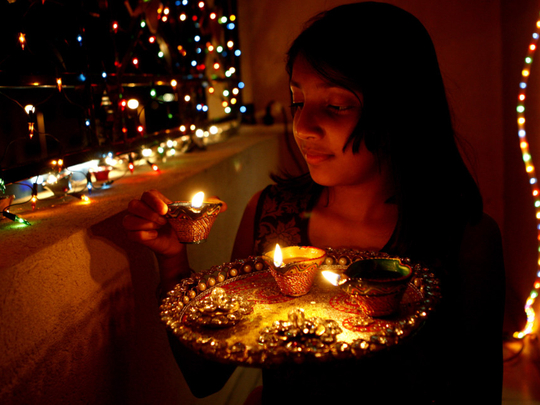
Wrapped in myth and steeped in tradition, Diwali, or the festival of lights, is celebrated across in India in myriad ways. And while the occasion marks the onset of winter and heralds the Hindu new year, each community in India has its own traditions for the event.
By the day
Most of India divides Diwali into five days. In the north and west, for instance, the event is split into Dhanteras or festival of wealth, where traditionally people buy gold or other metal; Naraka Chaturdasi (Chhoti Diwali) which is marked by firecrackers and family meetings; Amavasya (night of no moon) or Diwali day, where people pray to Lakshmi, the deity of wealth, and start the new year and the financial year.
It also marks the day when Rama returned with Sita and Lakshman to Ayodhya after a 14-year exile and after killing the demon Ravana. The people welcomed them by lighting up the no-moon night with diyas (earthen oil lamps); Kartika Shuddha Padyami (the first day of the new year), when family is of primary importance and a 64-item feast is offered to the deity Krishna and partaken by family and friends; and Bhai Duj, a ritual to commemorate brother-sister relationships.
In the South, the festival’s celebrations begin at the crack of dawn on Diwali [or Deepawali, string of lamps] day, with a ritual oil bath, followed by lehiyan, a drink to cleanse the system; followed by the bursting of crackers to symbolise the death of a monster; and the evening is made bright with another round of fire crackers.
Sikhs celebrate on Diwali day because in 1577 the foundation stone of the Golden Temple was laid in Amritsar, Punjab. For the Jains, Diwali day holds significance as Lord Mahavira attained moksha or nirvana (enlightenment) on the day. They celebrate the next day of Diwali as new year’s day.
By the legend
Different legends accompany this celebration. While north India celebrates the return of Ram, south India celebrates the day Krishna defeated the demon Narakasura. In western India, the festival marks the moment the deity Vishnu defeated the demon King Bali and banished him to the nether world. East India, on the other hand, especially Bengal, celebrates the new year and believes the deity Kali killed the demon Bakrasura on this occasion.
When is it celebrated?
Diwali is celebrated between October and November in India; a date determined by the Hindu lunar calendar.
The science behind rangoli
Did you know that original rangoli designs had a scientific reason behind them? Not much different to sound wave patterns, rangoli was drawn to bring harmony and good energy to a home and to give good vibes to guests. Interestingly, different orthodox households had different rangoli patterns.
Not just an Indian thing
Diwali isn’t just celebrated in India. It marks a national holiday in Trinidad & Tobago, Myanmar, Nepal, Sri Lanka, Mauritius, Guyana, Surinam, Singapore, Malaysia and Fiji. We’re thinking exotic holiday.
One for the lazy folks
Want to really get in on the act, with the right chants, sweets and wallpapers, but don’t know where to begin? Download the Diwali Dhamal app from google play or Happy Diwali 2014 from the iTunes store. They even give you a shopping list, so you don’t need to make your own. Now, this is the way to Diwali.
Ready for the broom?
Did you know that on Diwali, many households pray to the “broom”? They buy new brooms on the day and clean the house at midnight, symbolically cleansing the house to usher in wealth and prosperity.
Of life and death
In some parts of the country, Yama, the deity of death, is worshipped. It is believed that by doing so, one can appease him and thus live a longer life.
Calling all ancestors
In Odisha, jute stems are burnt during Diwali. This is to call upon one’s ancestors and help them on their journey to heaven.
Play your cards right
Playing cards is considered auspicious on Diwali. This is because according to mythology, Shiva and Parvati were playing on this night and when she won the game, she decreed that playing a round would usher in wealth and prosperity.




